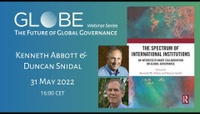GLOBE Webinar | The Spectrum of International Institutions
Kenneth Abbott (Arizona State University) and Duncan Snidal (University of Oxford)
Disponible en video:
Kenneth Abbott (Arizona State University) and Duncan Snidal (University of Oxford) join the GLOBE Webinar Series to discuss their new book 'The Spectrum of International Institutions: An Interdisciplinary Collaboration on Global Governance' (Routledge). Charles Roger (Institut Barcelona d'Estudis Internacionals) will then offer some reflections before an audience Q&A.
The GLOBE Webinar Series – The Future of Global Governance – presents the latest and most cutting-edge research in global governance and gives audience members the opportunity to directly engage with leading scholars in the field. Each webinar focuses on a significant new book that has potential to shape future thought on global governance, featuring a presentation by the author, an intervention from an expert discussant, and a Q&A session with the audience.
Participation is free and the webinar can be joined from anywhere in the world. Access the GLOBE Webinar Channel and check the featured videos for the past webinars
About the book: This book collects and integrates Abbott and Snidal’s influential scholarship on indirect global governance, with a new analytical introduction that probes the role of indirect governance techniques in the universe of global governance arrangements. The volume presents the Governance Triangle, a now widely-used figure that demonstrates and helps to assess the proliferation of private and public-private standard-setting organizations, along with new forms of intergovernmental institutions, over recent decades. It then analyzes how intergovernmental organizations, regulatory bodies, and other "global governors" enlist and work through those organizations as intermediaries, so as to govern more effectively and gain knowledge, influence and legitimacy. It demonstrates Abbott’s and Snidal’s groundbreaking concept of orchestration, a mode of indirect governance in which influential governors catalyze, support, and steer intermediary organizations through wholly voluntary relationships. It also considers their more recent innovations in the theory of indirect governance. These include additional modes of governance, such as co-optation, delegation and trusteeship, as well as the pervasive "Governor’s Dilemma" trade-off between a governor’s control of its intermediaries and the intermediaries’ competence.
Discussant: Charles Roger (IBEI)
Moderator: Kari Otteburn (KU Leuven)

